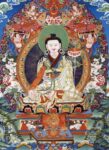
Edited by C. R. Lama
Translated by C. R. Lama and James Low
Revised by James Low (2018/20)
Chöd (Tibetan, gcod lit. ‚to sever‘), is a spiritual practice found in the Bön tradition as well as in the Nyingma and Kagyu schools of Tibetan Buddhism. It originated in the 11th century and is still practised today. Also known as Cutting Through the Ego, the practices are based on the Prajñāpāramitā or Perfection of Wisdom sūtras, which expound the emptiness concept of Buddhist philosophy.
According to Mahāyāna Buddhists, emptiness is the ultimate wisdom of understanding that all things lack inherent existence. Chöd combines prajñāpāramitā philosophy with specific meditation methods and tantric ritual. The chöd practitioner seeks to tap the power of fear through activities such as rituals set in graveyards, and visualisation of offering their bodies in a tantric feast in order to put their understanding of emptiness to the ultimate test.
Chöd literally means „cutting through“. It cuts through hindrances and obscurations, sometimes called ‚demons‘ or ‚gods‘. Examples of demons are ignorance, anger and, in particular, the dualism of perceiving the self as inherently meaningful, contrary to the Buddhist doctrine of anatta (non-self). This is done in a powerful meditative ritual which includes „a stunning array of visualizations, song, music, and prayer, it engages every aspect of one’s being and effects a powerful transformation of the interior landscape.“
According to Jamgön Kongtrül, Chöd involves „accepting willingly what is undesirable, throwing oneself defiantly into unpleasant circumstances, realising that gods and demons are one’s own mind, and ruthlessly severing self-centered arrogance through an understanding of the sameness of self and others.“

Jigme Lingpa (‚Jigs-med gling-pa, 1730–1798) was a Tibetan tertön of the Nyingma lineage of Tibetan Buddhism. He was the promulgator of the Longchen Nyingthik, the Heart Essence teachings of Longchenpa, from whom, according to tradition, he received a vision in which the teachings were revealed. The Longchen Nyingthik eventually became a very famous and widely practised cycle of Dzogchen teachings. The Sound of Dakini Laughteris a well known Chöd sādhanā from the Longchen Nyingtik.
edition khordong im Wandel Verlag, Berlin, Juli 2020, 44 Seiten, mit Illustrationen, teilw. farbig, gehefteter Pappeinband, 22×15cm, 100g, 10,80 € zzgl. Porto, ISBN: 978-3-942380-29-4
Gedruckt in Berlin auf FSC zertifiziertem 100% OBA- , säure, chlor- und holzfreiem, recycle- und biologisch abbaubarem Papier, alterungsbeständig gemäß ISO 9706.
Dear Readers, dear Dharma Friends, please note:
Practice texts, and Dharma books in general, are means for realising freedom from suffering and are seen as Buddha’s words. Please treat them respectfully. Before reading and practising dharma texts of this sort, it is customary to receive a formal transmission (Lung; āgama) of the words. To empower you for the mandala, you should receive the initiation (dBang, pron.: ‘wang’; abhiṣeka). To gain a proper understanding of how to apply the methods contained in the text, you should receive oral teachings (Man Ngag) by a qualified master of the tradition. One should also know the obligations (Dam Tshig; samaya) connected with the practice. So, in order to learn tantric meditation techniques in the proper way, you should rely an a trustworthy and learned teacher (bLama). This is especially important for wrathful practices. But in any case, books like this can be kept for veneration on your shrine. Meditate and pray that the teachings become integrated into your life so that you become a better person and bring great benefit to the world. Samaya
Oppelner Str. 28
10997 Berlin
Deutschland
mail@wandel-verlag.de

